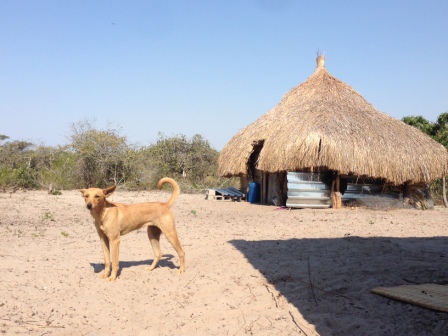Covid-19: The epidemic reveals the cracks in our health and welfare systems
Improving services in rural KwaZulu-Natal

The author explains how Covid-19 and the subsequent lockdown have provided an opportunity to rethink health systems in her area.
The afternoon sun cast a glow through the trees as we bounced our way along the soft sand of a little-used jeep track in northern KwaZulu-Natal. At regular intervals, the community health worker accompanying us would mutter ‘left’ or ‘right’.
After a good hour without passing any homesteads, we made a sharp turn into a small clearing with three dilapidated reed huts. I got out to drag open the gate and was met with a wholly unexpected Johannesburg accent: “Hey sister, how’s it going?” We had arrived at the last homestead of our day, to visit a middle-aged woman with paraplegia of an unknown cause who had been issued a wheelchair three years ago and had since disappeared off our clinic radar.
The district had seen no cases of Covid-19 community transmission throughout the lockdown period, and after an initial (and natural) panic during which all rehab outpatient and clinic consultations were halted and some team building, resource assessment and strategising took place, our rehab department had settled on a pragmatic approach. We would piggy-back the government-led Covid-19 screening initiative to continue providing services for people with moderate and severe disabilities. We would screen all staff daily and screen all inhabitants of a homestead before entering.
This seemed simple, but turned out to involve amalgamating four separate programmes and databases (dating back to 2009), and ranking each client in terms of priorities across each programme in order to obtain an average priority rating. This was so that we could deal with the sheer numbers of clients who usually came to clinics and who would now require home visits. It also gave us a chance as a multi-disciplinary team to identify shared clients, identify shared concerns and flag clients lost to follow up. Low-priority clients were contacted telephonically. We also had to up-skill staff and find our way through areas which were not covered by any community health worker. The spin-offs included a more cohesive team, more comprehensive care, and the chance to trace several clients who had fallen off our radar.
Three people usually live in this homestead: a grandmother, a mother (our client) and her daughter, all of whom survive off the grandmother’s state pension. But now there are three extra residents: young men who have returned from closed construction sites in Johannesburg, forced to “wait it out” back home.
The wheelchair issued in 2017 sat idly in the corner of the yard, the sand too thick to get through on it and the user’s movements limited by lack of early intensive rehabilitation. The closest clinic is a three-hour walk through beach sand and a return taxi ride costs R60, not including charges for transporting any groceries bought in town.
Yesterday, the pensioner had spent the last of her money getting to town, only to be told that there had been an error on the part of SASSA and her pension would only be deposited the next day. She shrugged. “It wouldn’t be so difficult if we didn’t suddenly have six of us to feed.”
Our client has been trying since 2018 to get a birth certificate, an ID and access a much-needed disability grant. “What happened?” “Nothing.”
This was the third homestead we’d visited in one day with extra family members to feed and unresolved problems with documents.
Immediate attempts to reach contacts at Home Affairs and the Department of Social Development were unsuccessful. “Wait for the R350 grant, you can apply on whatsapp soon.” “I’m sure your local offices will start delivering food parcels soon.” “Our Home Affairs systems are offline and I can’t even check the status of that application. Perhaps when lockdown 3 happens our router will be fixed and we can start ID applications and processing again.” “We’re on skeleton staff and only working every other day. The person who deals with that is not on duty today.”
The list of excuses seemed endless, and the rudimentary home assessment, rehabilitation session and home programme I offered seemed pointless in the face of the more pressing need for immediate survival. All I could do was promise that I would return — bearing in mind that the family had not received a visit from a single health professional in three years — and I would also bring a month’s worth of groceries sponsored by a local faith-based organisation.
Covid-19 and the subsequent lockdown have had catastrophic effects, but it is also important to embrace the opportunities such a tumultuous time offers us. Opportunities to rethink what we are doing, how we are doing it and why. Opportunities to regroup, strategise and redress. Without the lockdown, this KwaZulu-Natal family would not have been identified and — eventually — helped. Without the support of our hospital management for a “disability-specific” Covid-19 outreach, a well-established and passionate rehabilitation team, willing community health workers, and others who helped us trace and identify families like this, some of those who need help would remain unknown.
It is at times like lockdown that the glaring cracks in every system and every level of service start to show. We should seize the opportunity to humbly examine why the best-intentioned policies failed at implementation level, and then we should get out there and fix the problem. This will take a collaborative effort from everyone with the humility to listen to those at the bottom and with the power to effect change, however small.
Next: 18,000 jobs lost in wine industry – Vinpro
Previous: NPA and IPID commit to tackling high-level police corruption
© 2020 GroundUp.
This article is licensed under a Creative Commons Attribution-NoDerivatives 4.0 International License.
You may republish this article, so long as you credit the authors and GroundUp, and do not change the text. Please include a link back to the original article.


